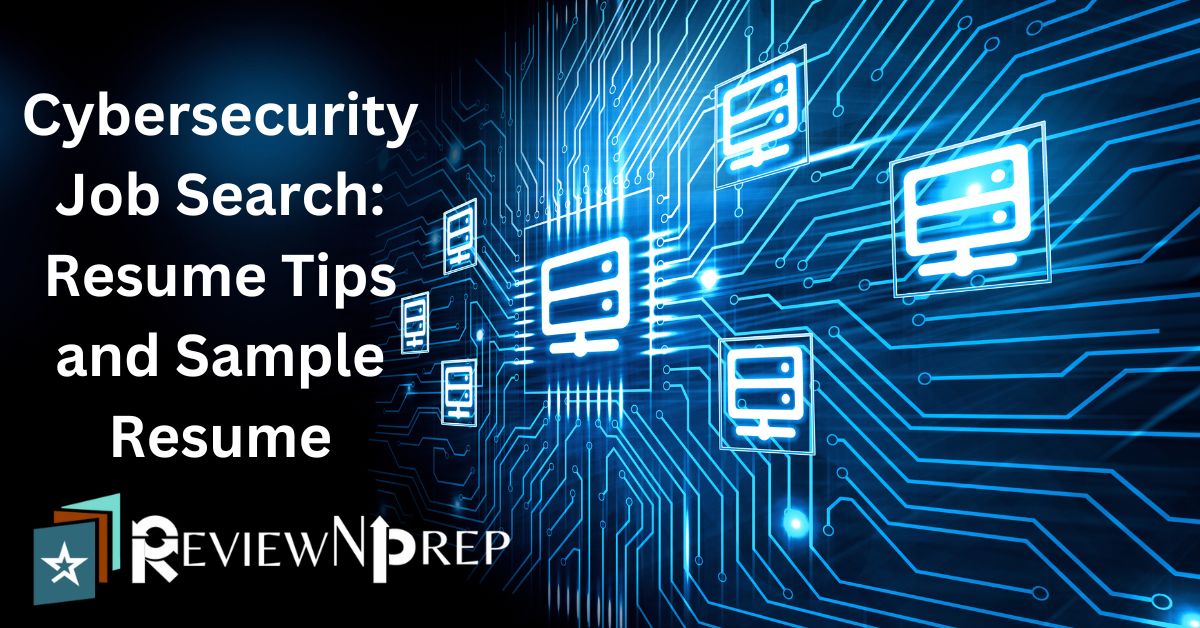|
|
In the rapidly evolving world of cybersecurity, having a well-crafted resume is crucial to land the job of your dreams. With the increasing demand for cybersecurity professionals, the competition is fierce. To stand out in the crowd and secure an interview, your resume must highlight your skills, experience, and potential as a cybersecurity expert.
In this blog, we will provide you with valuable resume and interview tips specific to the cybersecurity field, along with a sample cybersecurity resume to help you get started.
Table of Contents
Resume Tips to Make Your Cybersecurity Resume Stand Out
1. Start with a Strong Header
Your resume should begin with a clear and concise header. Include your name, phone number, email address, and LinkedIn profile (if applicable). Make sure your contact information is up to date and professional.
2. Craft an Engaging Summary or Objective
In a few lines, summarize your career goals and aspirations in the cybersecurity field. Mention your level of education and your deep understanding of cybersecurity concepts.
3. Highlight Technical Skills
List your technical skills in a dedicated section, including relevant keywords like “Malware analysis,” “network security,” “penetration testing,” and “incident response.” Be honest about your proficiency level with each skill.
4. Emphasize Professional Experience
Under the “Professional Experience” section, detail your previous roles in reverse chronological order. For each position, include the job title, employer, dates of employment, and a brief job description. Use bullet points to highlight your accomplishments, focusing on how you contributed to the security posture of your organization.
5. Tailor Your Resume to the Job Description
Customize your resume for each prospective employer. Analyze the job description, and align your resume with the specific requirements and keywords mentioned in the posting.
6. Showcase Transferable and Interpersonal Skills
In the “Soft Skills” section, emphasize your interpersonal skills, critical thinking, and analytical abilities. Cybersecurity professionals need more than technical knowledge; they must also work well with teams and adapt to dynamic situations.
7. Discuss Relevant Certifications
If you hold certifications such as CISSP, CompTIA Security+, or CEH, make sure to include them in your resume. These certifications demonstrate your commitment to the cybersecurity industry.
8. Describe Your Contributions
Use quantifiable achievements to demonstrate your impact. For example, mention how you improved security measures, reduced cyber threats, or enhanced the security posture of your organization.
9. Address Security Clearances
If you possess any security clearances, clearly mention them in your resume. This information can be a deciding factor for certain cybersecurity roles.
10. Keep It Concise and Error-Free
Limit your resume to one or two pages, and proofread it thoroughly for grammatical and typographical errors. Use a clean, professional format and fonts.
Cybersecurity Interview Tips
Preparing for a cybersecurity interview is as crucial as crafting a stellar resume. Here are some interview tips tailored to the cybersecurity field:
1. Research the Company and Industry
Gain a deep understanding of the prospective employer’s cybersecurity framework, security measures, and recent security threats. This knowledge will help you discuss relevant experiences during the interview.
2. Be Ready for Technical Questions
Expect technical questions related to your key skills, experiences, and potential scenarios you might encounter in the role. Brush up on cybersecurity concepts and be prepared to explain your thought process.
3. Discuss Your Career Aspirations
Show enthusiasm for the cybersecurity industry and discuss your long-term career goals. Employers often seek candidates who are committed to growing in the field.
4. Showcase Your Problem-Solving Skills
Cybersecurity professionals often face complex challenges. Highlight your ability to analyze risks, respond to incidents, and think critically.
5. Prepare for Behavioral Questions
Be ready to answer behavioral questions that assess your soft skills and how you handle different situations in a team environment.
6. Ask Questions
At the end of the interview, ask thoughtful questions about the company’s security posture, cyber risk management, and the role’s responsibilities. This demonstrates your genuine interest.
Now, let’s take a look at a sample cybersecurity resume:
Sample Cybersecurity Resume

Here is an online version of the cybersecurity resume that you can create on ReviewNPrep.
John Doe
Phone: (123) 456-7890 | Email: john.doe@email.com | LinkedIn: linkedin.com/in/johndoexyz
Summary: Enthusiastic cybersecurity professional with a Master’s degree in Cybersecurity and a deep understanding of security measures. Committed to enhancing security postures, analyzing risks, and mitigating cyber threats. Seeking a challenging cybersecurity role to contribute expertise in malware analysis and incident response.
Technical Skills: Malware Analysis, Network Security, Penetration Testing, Incident Response, Risk Analysis, Security Measures, Security Framework
Professional Experience:
Cyber Security Engineer | XYZ Cybersecurity Solutions | January 2020 – Present
- Conducted penetration tests, identifying vulnerabilities and recommending security measures, resulting in a 25% reduction in cyber risks.
- Led incident response teams to mitigate security threats, minimizing data breaches and ensuring business continuity.
- Collaborated with clients to implement robust security frameworks aligned with industry best practices.
Cybersecurity Analyst | ABC Tech | June 2018 – December 2019
- Analyzed and dissected malware to develop effective countermeasures, enhancing the organization’s security posture.
- Collaborated with cross-functional teams to conduct risk assessments and create comprehensive risk analysis reports.
- Assisted in the development and implementation of security measures, reducing security threats by 30%.
Education:
- Master of Science in Cybersecurity | Cybersecurity University | Graduated in 2018
- Bachelor of Science in Computer Science | Tech College | Graduated in 2016
Certifications:
- Certified Information Systems Security Professional (CISSP)
- CompTIA Security+
- Certified Ethical Hacker (CEH)
Soft Skills: Analytical Skills, Critical Thinking, Interpersonal Skills, Transferable Skills
Career Goals: To advance my career in the cybersecurity industry, continually expanding my technical knowledge and contributing to the enhancement of cyber security measures.
Conclusion
Remember, your resume is your first impression on potential employers. By following these tips and tailoring your resume to the specific cybersecurity role you’re applying for, you’ll increase your chances of standing out and securing that coveted interview. Good luck on your journey to a rewarding career in cybersecurity!

